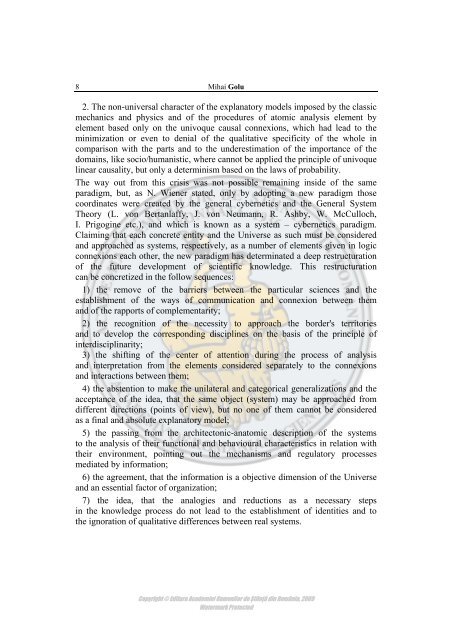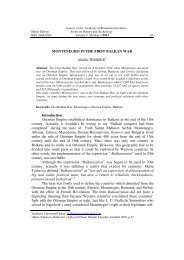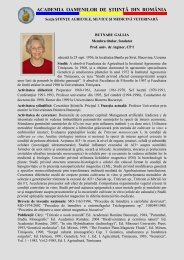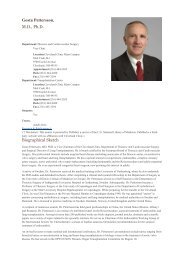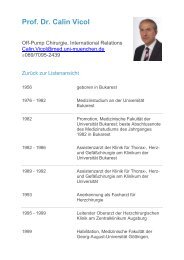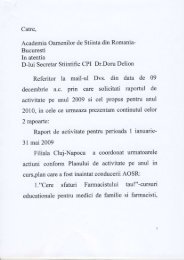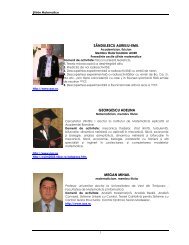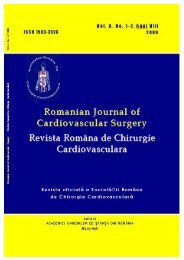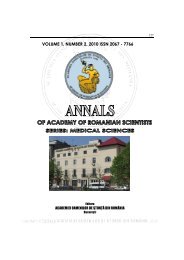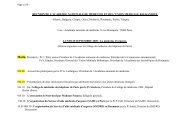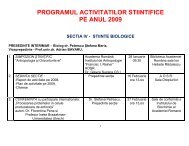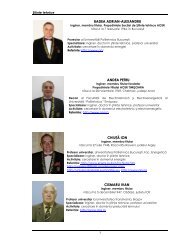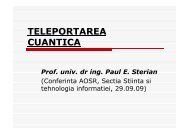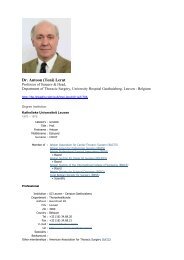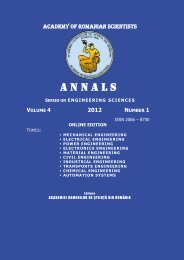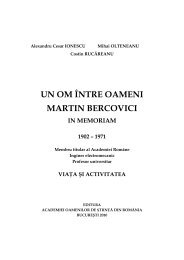PROCEEDINGS - Academia Oamenilor de Stiinta din Romania
PROCEEDINGS - Academia Oamenilor de Stiinta din Romania
PROCEEDINGS - Academia Oamenilor de Stiinta din Romania
You also want an ePaper? Increase the reach of your titles
YUMPU automatically turns print PDFs into web optimized ePapers that Google loves.
8 Mihai Golu<br />
2. The non-universal character of the explanatory mo<strong>de</strong>ls imposed by the classic<br />
mechanics and physics and of the procedures of atomic analysis element by<br />
element based only on the univoque causal connexions, which had lead to the<br />
minimization or even to <strong>de</strong>nial of the qualitative specificity of the whole in<br />
comparison with the parts and to the un<strong>de</strong>restimation of the importance of the<br />
domains, like socio/humanistic, where cannot be applied the principle of univoque<br />
linear causality, but only a <strong>de</strong>terminism based on the laws of probability.<br />
The way out from this crisis was not possible remaining insi<strong>de</strong> of the same<br />
paradigm, but, as N. Wiener stated, only by adopting a new paradigm those<br />
coor<strong>din</strong>ates were created by the general cybernetics and the General System<br />
Theory (L. von Bertanlaffy, J. von Neumann, R. Ashby, W. McCulloch,<br />
I. Prigogine etc.), and which is known as a system – cybernetics paradigm.<br />
Claiming that each concrete entity and the Universe as such must be consi<strong>de</strong>red<br />
and approached as systems, respectively, as a number of elements given in logic<br />
connexions each other, the new paradigm has <strong>de</strong>terminated a <strong>de</strong>ep restructuration<br />
of the future <strong>de</strong>velopment of scientific knowledge. This restructuration<br />
can be concretized in the follow sequences:<br />
1) the remove of the barriers between the particular sciences and the<br />
establishment of the ways of communication and connexion between them<br />
and of the rapports of complementarity;<br />
2) the recognition of the necessity to approach the bor<strong>de</strong>r's territories<br />
and to <strong>de</strong>velop the correspon<strong>din</strong>g disciplines on the basis of the principle of<br />
interdisciplinarity;<br />
3) the shifting of the center of attention during the process of analysis<br />
and interpretation from the elements consi<strong>de</strong>red separately to the connexions<br />
and interactions between them;<br />
4) the abstention to make the unilateral and categorical generalizations and the<br />
acceptance of the i<strong>de</strong>a, that the same object (system) may be approached from<br />
different directions (points of view), but no one of them cannot be consi<strong>de</strong>red<br />
as a final and absolute explanatory mo<strong>de</strong>l;<br />
5) the passing from the architectonic-anatomic <strong>de</strong>scription of the systems<br />
to the analysis of their functional and behavioural characteristics in relation with<br />
their environment, pointing out the mechanisms and regulatory processes<br />
mediated by information;<br />
6) the agreement, that the information is a objective dimension of the Universe<br />
and an essential factor of organization;<br />
7) the i<strong>de</strong>a, that the analogies and reductions as a necessary steps<br />
in the knowledge process do not lead to the establishment of i<strong>de</strong>ntities and to<br />
the ignoration of qualitative differences between real systems.<br />
Copyright © Editura Aca<strong>de</strong>miei <strong>Oamenilor</strong> <strong>de</strong> Știință <strong>din</strong> România, 2009<br />
Watermark Protected


